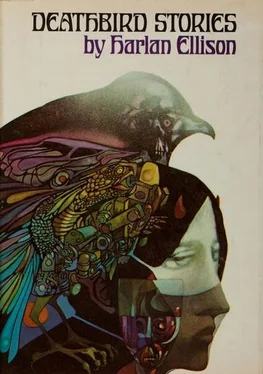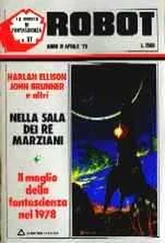And he thought of his foot.
“We went away, Vern. We had to. We hoped—” She stopped.
“You hoped I’d be convicted and shot or sent away.”
She said nothing.
He thought of the hooch and the smell.
“Okay, Sis. I understand.”
“I’m sorry, Vernon. I’m really sorry, dear. But why did you do this to us? Why?”
He didn’t answer for a long time, and finally she came to him, and put her arms around him and kissed his neck, and then she slipped away in the darkness and the wall boards creaked, and he was alone.
He sat there in the pew, thinking nothing. He stared at the shadows till his eyes played him tricks and he thought he saw little speckles of light dancing. Then the light glimmers changed and coalesced and turned red and he seemed to be staring first into a mirror, and then into the eyes of some monstrous creature, and his head hurt and his eyes burned….
And the church changed, melted, swam before his eyes and he fought for breath, and pulled at his throat, and the church re-formed and he was in the hooch again; they were questioning him.
He was crawling.
Crawling across a dirt floor, pulling himself forward with his fingers leaving flesh-furrows in the earth, trying to crawl away from them.
“Crawl! Crawl and perhaps we will let you live!”
He crawled and their legs were at his eye level, and he tried to reach up to touch one of them, and they hit him. Again and again. But the pain was not the worst of it. The monkey cage where they kept him boxed for endless days and nights. Too small to stand, too narrow to lie down, open to the rain, open to the insects that came and nested in the raw stump of his leg, and laid their eggs, and the itching that sent lilliputian arrows up into his side, and the light that hung from jerry-rigged wires through the trees, the light that never went out, day or night, and no sleep, and the questions, the endless questions…and he crawled…God how he crawled…if he could have crawled around the world on both bloody hands and one foot, scouring away the knees of his pants, he would have crawled, just to sleep, just to stop the arrows of pain…he would have crawled to the center of the earth and drunk the menstrual blood of the planet…for only a time of quiet, a straightening of his legs, a little sleep….
Why did you do this to us, why?
Because I’m a human being and I’m weak and no one should be expected to be able to take it. Because I’m a man and not a book of rules that says I have to take it. Because I was in a place without sleep and I didn’t want to be there and there was no one to save me. Because I wanted to live.
He heard boards creaking.
He blinked his eyes and sat silently and listened, and there was movement in the church. He reached for his smoked glasses, but they were out of reach, and he reached farther and the crutch slid away from the pew seat and dropped with a crash. Then they were on him.
Whether it was the same bunch he never knew.
They came for him and vaulted the pews and smashed into him before he could use whatever it was he’d used on the kid at the house, the kid who lay on a table in the City Hall, covered with a sheet through which green stains and odd rotting smells oozed.
They jumped him and beat him, and he flailed up through the mass of bodies and was staring directly into a wild-eyed mandrill face, and he looked at him.
Looked at him. As the deathbeast struck.
The man screamed, clawed at his face, and his face came away in handfuls, the rotting flesh dripping off his fingers. He fell back, carrying two others with him, and Lestig suddenly remembered what had happened in the hooch, remembered breathing and looking and here in this house of a God gone away he spun on them, one by one, and he breathed deeply and exhaled in their faces and stared at them across the evil night wasteland of another universe, and they shrieked and died and he was all alone once more. The others, coming through the vestry wall, having followed Neola, having been telephoned by Gary Howard, who had beaten the information from his wife, the others stopped and turned and ran….
So that only Lestig, brother to the basilisk, who was itself the servant of a nameless dark one far away, only Lestig was left standing amid the twisted body shapes of things that had been men.
Stood alone, felt the power and the fury pulsing in him, felt his eyes glowing, felt the death that lay on his tongue, deep in his throat, the wind death in his lungs. And knew night had finally fallen.
They had roadblocked the only two roads out of town. Then they took eight-cell battery flashlights and Coleman lanterns and cavecrawling lamps, and some of them who had worked the zinc mine years before, they donned their miner’s helmets with the lights on them, and they even wound rags around clubs and dipped them in kerosene and lit them, and they went out searching for the filthy traitor who had killed their sons and husbands and brothers, and not one of them laughed at the scene of crowd lights moving through the town, like something from an old film. A film of hunting the monster. They did not draw the parallel, for had they drawn the parallel, they would still never have laughed.
And they searched through the night, but did not find him. And when the dawn came up and they doused their lamps, and the parking lights replaced headlights on the caravans of cars that ringed the town, they still had not found him. And finally they gathered in the mall, to decide what to do.
And he was there.
He stood on the Soldiers and Sailors Monument high above them, where he had huddled all through the night, at the feet of a World War I doughboy with his arm upraised and a Springfield in his fist. He was there, and the symbolism did not escape them.
“Pull him down!” someone shouted. And they surged toward the marble-and-bronze monument.
Vernon Lestig stood watching them come toward him, and seemed unconcerned at the rifles and clubs and war-souvenir Lugers coming toward him.
The first man to scale the plinth was Gary Howard, with the broken-field cheers of the crowd smile on his face. Lestig’s eyes widened behind the smoked glasses, and very casually he removed them, and he looked at the big, many-toothed car salesman.
The crowd screamed in one voice and the forward rush was halted as the still-smoking body of Teresa’s husband fell back on them, arms flung out wide, torso twisted.
In the rear, they tried to run. He cut them down. The crowd stopped. One man tried to raise a revolver to kill him, but he dropped, his face burned away, smoking pustules of ruined flesh where his eyes had been.
They stopped. Frozen in a world of muscles that trembled, of running energy with no place to go.
“I’ll show you!” he yelled. “I’ll show you what it’s like! You want to know, so I’ll show you!”
Then he breathed, and men died. Then he looked and others fell. Then he said, very quietly, so they would hear him: “It’s easy, till it happens. You never know, patriots! You live all the time and you say one thing or another, all your rules about what it takes to be brave, but you never know, till that one time when you find out. I found out, it’s not so easy. Now you’ll find out.”
He pointed to the ground.
“Get down on your knees and crawl, patriots! Crawl to me and maybe I’ll let you live. Get down like animals and crawl on your bellies to me. “
There was a shout from the crowd; and the man died.
“Crawl, I said! Crawl to me!”
Here and there in the crowd people dropped from sight. At the rear a woman tried to run away and he burned her out and the husk fell, and all around her, within sight of the wisps of smoke from her face, people fell to their knees. Then entire groups dropped; then one whole side of the mob went down. Then they were all on their knees.
Читать дальше












